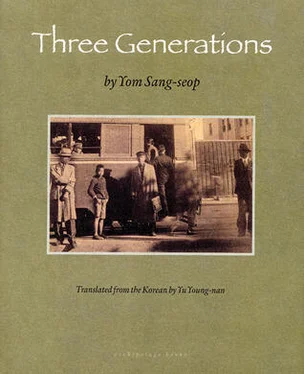“Really!” Deok-gi was stunned. “Did he spend it all on women?”
“No. He ran away to Shanghai, and we’ll never forgive him for what he did to our family.”
The two now felt that the initial barrier that separated them had disappeared. They switched to a more respectful manner of speech, appropriate for old friends.
“When my father was released from prison on probation because of his illness, we were still living with my mother’s family and providing three meals a day wasn’t easy, never mind what it took to pay for Father’s medicine. He was ill for almost a year. You can’t imagine how sad it was.”
Gyeong-ae suddenly seemed hesitant to talk so openly about such memories.
Deok-gi waited for her to continue. Gyeong-ae’s eyes were on the child. It looked as if the little girl had fallen into a light sleep, breathing regularly, but suddenly she began screaming and rocking her body back and forth as if a heavy weight were pressing down on her.
“I should go.” Deok-gi stood up.
“Are you leaving tomorrow then?” Still seated, Gyeong-ae looked up. As much as she wanted to talk, she didn’t want to press him to stay.
“Well, if I come home during spring vacation, let’s get together.”
“I’ll let you find your own way out.” Gyeong-ae stood up as she comforted the crying child.
“Yes, it wouldn’t be good for her to be out in the cold.”
As Deok-gi was putting on his shoes, Gyeong-ae’s mother came out to the veranda and said, “Be careful on your way home in the dark.”
He wondered what insults she might hurl at him as he left, but her farewell was unexpectedly brief. From the inner room, he heard Gyeong-ae’s voice echo, “Yes, be careful on the way home.”
Released from the humid, stifling room, the cold night air felt refreshing. The chill lifted Deok-gi’s spirits, and he felt as though he had just escaped captivity.
That’s it! So that’s when it all began. No wonder she stopped talking to me all of a sudden.
As he found his way out of the dark winding alley, Deok-gi thought back to a day some five or six years ago. Gyeong-ae had arrived at the Hwagae-dong house on a winter day to see his father when Deok-gi was still living there.
They had last seen each other three or four years earlier at elementary school. After graduation Deok-gi attended a different church in Anguk-dong, close to Hwagae-dong. To his surprise, she seemed taller and quite a bit more mature. He felt she was looking down on him somehow, as if he were a child. Although he was glad to see her, he felt ill at ease with her and was much more timid than she.
Later he asked his father why she had come by. His father said simply that Gyeong-ae’s mother went to Namdaemun Church and that her father, who had been sick for nearly a year since his release from prison, was now dying. At the time, Deok-gi felt sorry for his old school friend and suspected nothing else, but now he figured she must have been sent by her mother to borrow some money.
Gyeong-ae’s father was a patriot. Everyone recognized his name as a religious activist, _____ from Suwon, and he was enough of a celebrity to merit several lines in the newspapers whenever prison news was featured as well as later on when he was released on probation. Churchgoers respected Gyeong-ae’s mother as his wife. The pastor even mentioned him in prayers: Almighty Father, we ask that you let this son of yours remain longer in this world so that he can help our cause. He went on to pray for his recovery from the grave illness that threatened his life. Gyeong-ae’s mother felt privileged to be the center of so much attention, but her husband’s illness continued to worry her, and she didn’t really know how to take care of him. From that moment on, her stature rose within the church, and Gyeong-ae’s beauty seemed to shine even more radiantly. After services, Gyeong-ae’s mother, her face aglow, busily fielded a flurry of exaggerated greetings and sympathies expressed for her husband’s illness from a multitude of new best friends whose names she didn’t even know.
One well-wisher from the church was Deok-gi’s father, Jo Sang-hun. It was especially gratifying to receive such thoughtful inquiries from a man not only generous and rich, but trusted, revered, and powerful. Jo Sang-hun was particularly kind and gentle with her. It would be an insult to his honor and character to say that he treated her with such respect only because Gyeong-ae, her daughter, was a student at his school and a young woman much admired in the church for her beauty and intelligence. No one considered Jo’s kindness in this light, and certainly Jo Sang-hun himself had no ulterior motive.
Jo Sang-hun would always ask Gyeong-ae about her father’s condition with genuine concern. When he saw her mother, he inquired: “Has there been any improvement? I often think of visiting him, but I’m so busy that I keep making excuses. I’ve never met him, but I really should call on him as one of our distinguished elders, illness aside.” Could she tell him what would be a good time to visit?
After repeating these pleasantries several times, Jo Sang-hun set a time to call at Gyeong-ae’s uncle’s house in Migeun-dong one Sunday that early winter, along with the pastor, to comfort the sick man and to pay his respects. After the service, Gyeong-ae and her mother showed them the way.
Gyeong-ae’s father was glad to see his guests and sat up in bed to welcome them. He was very ill with bronchitis and a kidney inflammation, and had been hanging on to life by dint of sheer will. Sang-hun was surprised to see that his hair was graying; he looked well over sixty, though his wife was only about forty. Gyeong-ae’s mother was actually his third wife, almost like a young concubine, and Gyeong-ae was his only child. This wife had given birth to a son and a daughter but only Gyeong-ae survived.
The room wasn’t warm enough to combat the cold spell before the winter solstice. Sang-hun noticed Western medicine bottles, coated with dust, at the head of the bed and frozen dregs of herbal remedies thrown into the straw basket inside the middle gate. He pitied the old patriot, who, it appeared, couldn’t afford quality medical care.
Before taking his leave, he chatted with Gyeong-ae’s father about life in prison, the current education system, and society in general. After he had said good-bye, Sang-hun quietly called for the patriot’s wife and asked her to send her daughter or a messenger to his house after three o’clock. He repeated his address several times.
“Why? What for?” she asked, although she had her own ideas about what he had in mind.
“I think I have some medicine at home that might help your husband,” Sang-hun said.
That was why Gyeong-ae had first come to Hwagae-dong.
At the time Sang-hun had given her several ginseng roots, a ticket redeemable for a large bag of rice at the Daeseong Rice Mill near Namdaemun, which his father still managed, and an envelope into which he placed ten won. He included a polite letter in his own neat handwriting so that the family wouldn’t be ashamed to accept what he sent.
Sang-hun’s kindness stemmed from a deep sympathy for the old patriot and regret over such a miserable end. Never had he set out to produce the baby daughter, who today was sitting in Gyeong-ae’s lap, groaning with fever.
Several days later, Sang-hun paid another visit to the sick man. It wasn’t his intention to hear how grateful they were for his kindness. Still, the family surrounded him and thanked him profusely, almost to the point of groveling. Sang-hun’s pity for all of them was heartfelt.
In any event, the more they expressed their gratitude, the bigger his favors grew. On his second visit, he brought his own family doctor and had him examine the patient.
Читать дальше












